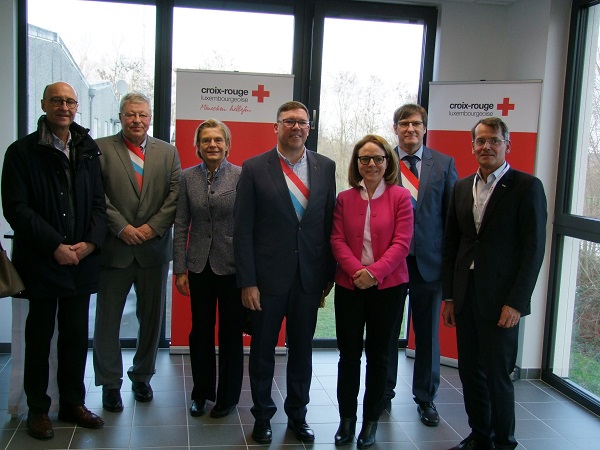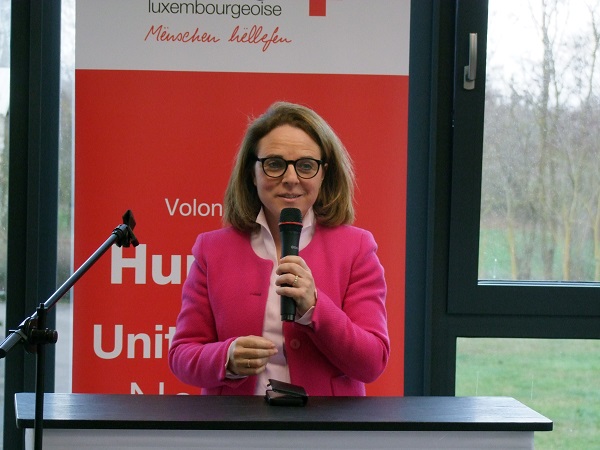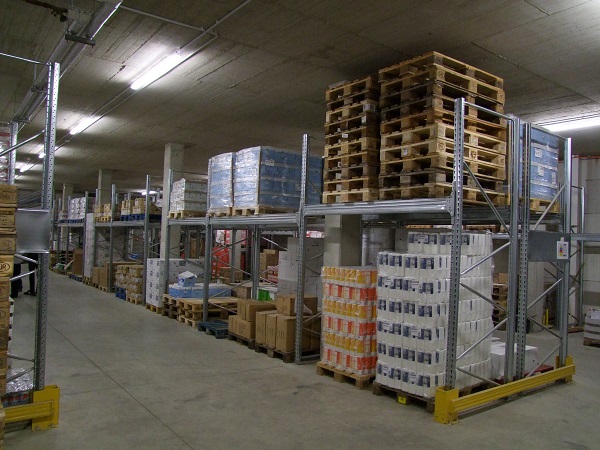 Credit: Chronicle.lu
Credit: Chronicle.lu
On Wednesday 1 February 2023, the Luxembourg Red Cross inaugurated their new depot at a light industrial zone in Livange, one of seven towns in the municipality of Roeser.
The new infrastructure is located close to motorway access and supports the centralised storage and distribution of foodstuffs and donated clothing. Other technical activities which are not usually in direct contact with the beneficiaries but which need space, storage and administration, are also installed there. The new depot, described as a logistics centre, is housed in a former furniture store which was purchased in 2019 before being renovated; it is spread over 5,600 m2 and houses a number of activities, including the following:
- the food logistics operator Spëndchen asbl (a storage, sorting and dispatching depot, formerly in Bertrange);
- the National Collection and Sorting Centre (CNCT) for donated clothes and shoes (formerly in Gasperich);
- The second-hand shop Vintage Mo(o)d, which is open to all (formerly in Bonnevoie)
- the IT and technical departments of the Luxembourg Red Cross;
- the technical department of Caritas Luxembourg.
In total, around 80 people - both employees and volunteers - work at the new depot in Livange; they are supported by more than 60 recipients of social assistance who are integrated into various services through the collective utility works scheme (TUC).
Chronicle.lu talked with Red Cross representatives who explained that the building cost €7 million to acquire, with Luxembourg Red Cross assets being complemented by funds from Luxembourg's Ministry of Family and Integration calculated on the basis of rental subsidies concerning their clothing and food logistics activities.
Michel Simonis, Director General of the Luxembourg Red Cross, explained that the new logistics centre will allow them to better help the most deprived members of society. He stated: "Our eight Red Cross Butteks (shops) have to have daily deliveries. The same goes for the four social grocery stores of Caritas. Only in this way, for example, can we distribute nationwide fresh food that is approaching its expiry date. And clothing donations also need to be sorted and washed before we release them to recipients".
Tom Jungen, the Mayor of Roeser, also addressed those attending the inauguration who included donors to the Luxembourg Red Cross.
Corinne Cahen, Minister of Family and Integration, explained that it is our duty to support citizens who cannot afford to buy from a supermarket or to buy from a clothes store. She stated: "Human dignity is most important and I am happy that the Luxembourg Red Cross and Caritas Luxembourg are joining forces to help people going through a very difficult phase of life".
The presentations were all in Luxembourgish and were followed by a tour of the facility (in two groups) and a cocktail reception.
National Collection and Sorting Centre
The National Centre for Collection and Sorting of Clothing Donations was created in 2015 and results from the merger of the existing activities of the Luxembourg Red Cross and Caritas Luxembourg. This collaboration makes it possible to meet the urgent clothing needs of people such as refugees, migrants, homeless people and other people in need. Thanks to the solidarity of people who donates clothes, the CNCT can avoid the destruction of used shoes and clothes and ensure a redistribution for adults, young people and children in need. In addition, this centre supplies the Vestiaires (changing rooms) of the Red Cross as well as the Kleederstuff of Caritas. This initiative is supported by the Ministry of Family, Integration and the Greater Region.
Spëndchen asbl
The Spëndchen logistics platform is a joint association created in 2009 by the Luxembourg Red Cross and Caritas Luxembourg as part of the opening of the first social grocery stores. Its objective is to organise the purchase of food and non-food products that it sells and/or distributes via social grocery stores. The platform is thus committed against food waste. The eight Red Cross Butteks and the four Caritas Butteks are what are known as social grocery stores that offer people on low incomes food and hygiene products at low prices - less than a third, or even a fifth for items with a short shelf life, of normal retail prices. Buttek customers thus have access to fresh, quality products, while seeing their purchasing power increase. The Ministry of Family, Integration and the Greater Region supports the activities of Spëndchen.
Vintage Mo(o)d
The Vintage Mo(o)d second-hand store was created in 2016 by the Red Cross. It offers for sale second-hand clothes and everyday objects that have been donated. The shop is open to everyone and encourages upcycling with the aim of generating income which will then allow people to buy new clothes, such as underwear, which are always missing in donations.










